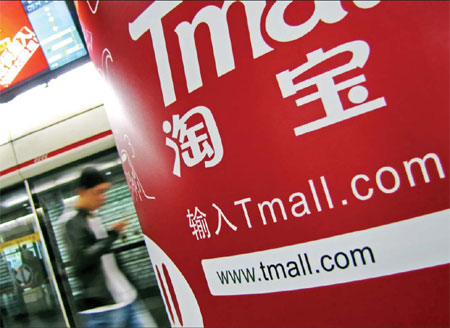Talking on Taobao

|
Taobao has enfranchised a generation of Internet shopkeepers, a group that has come together to form its own "Taobao culture". Jing Wei / for China Daily |
Learning the lingo can help improve Chinese online shopping experience
Shopping on Taobao (the popular shopping site heralded as "China's eBay") is not quite as simple as asking "How much?" and promptly exchanging money for goods and services. Taobao has enfranchised a generation of Internet shopkeepers, a group that has come together to form its own "Taobao culture".
Like all subcultures, this one has its own distinct patois. In order to make a successful transaction, this lingo does not necessarily have to be mastered, but it can serve to make the whole experience a lot smoother.
Despite taking place in the ethereal world of the Internet, the same social dynamics exist on Taobao as in most sectors of the service industry. Just like establishing rapport with your waiter in a restaurant reduces the risk of errant spittle finding its way into your soup, being friendly to a Taobao seller helps ensure that your order will be well-packaged and dealt with promptly.
Before we proceed, a warning: diabetics beware. Communication on Taobao is very saccharine - everyone calls each other "dear" and all items are "treasures". If bunny rabbits and anthropomorphized, smiling suns make your blood boil, Taobao may not be for you.
Basic Taobao vocabulary
掌柜 (Zhǎngguì): shopkeeper
Taobao sellers are referred to as zhanggui, meaning "shopkeeper". The all-purpose laoban (老板, boss) is also used.
拍 (pāi): bid/buy
Nowadays, most transactions are not auctions but straight, fixed-price purchases. Back when Taobao had a larger number of auctions, prices were routinely inflated by fake bids made by friends of the sellers. Despite the change, the initial act of making a purchase is still expressed using the verb pai (拍), "to bid", probably a holdover from Taobao's roots as an eBay clone. Once they have placed their "bid" (pāi xià 拍下), the customers then go on to pay through an Internet banking service.
親 (qīn): dear (buyers)
Not unlike a genial old tea lady or over-enthusiastic barkeep, most Taobao shopkeepers tend to refer to their customers as qin ("dear," "dearie", or if you prefer the British slang, "ducky"), whether they are young or old, male or female. While in real life, this may be deemed inappropriate, the friendly qin is like a ray of warmth reaching out across the cold wastes of cyberspace.
寶貝 (bǎobèi): treasure (any item for sale)
The tao (淘) in Taobao (淘寶) literally means "to dredge out" or "to pan for" (gold, etc) , and here it is used figuratively to mean "search for". The bao (寶) means "treasure" - so by the site's very name, navigating Taobao's digital marketplace is akin to searching for a valuable trinket in some labyrinthine oriental bazaar. Just in case you had any lingering doubts as to the quality of what you are looking at, all Taobao shopkeepers refer to their items as "treasures".
It is customary to talk your intended purchase over with the shopkeeper via Taobao's online messaging system before any purchases are made. Such dialogues usually go something like this:
Buyer: Are you there, shopkeeper?
Mǎi jiā: Zhǎngguì zài ma?
買家:掌柜在嗎?
Seller: I'm here, dearie!
Mài jiā: Zài de, qīn ~
賣家:在的,親~
Buyer: Is this particular "treasure" in stock? (followed by the name or hyperlink of the item in question)
Mǎi jiā: Qǐngwèn zhè jiàn bǎobèi yǒu huò ma?
買家:請問這件寶貝有貨嗎?
Seller: Oh, yes it is, feel free to bid, dearie.
Mài jiā: Yǒu de ó, qīn pāi xià ba.
賣家:有的哦,親拍下吧。
Buyer: Is shipping included?
Mǎi jiā: Bāo yóu ma?
買家:包郵嗎?
Seller: Yes it is dearie, remember to leave good feedback after it arrives!
Mài jiā: Bāo yóu de ó qīn, shōu dào jìde gěi hǎopíng ó qīn ~
賣家:包郵的哦親,收到記得給好評哦親~
Feedback
Giving feedback after a sale is completed is an essential part of the Taobao process. Feedback comes in roughly three forms: positive (好評 hǎo píng), neutral (中評 zhōng píng) and negative (差評 chà píng). Sellers live and die by their reviews, and anything less than positive feedback can be a death knell for their business prospects.
Examples of positive feedback:
The genuine article at a fair price.
Huò zhēn jià shí.
貨真價實。
The shopkeeper ships very quickly, and the express delivery was really something.
Zhǎngguì fā huò hěn kuài, kuàidì hěn gěi lì.
掌柜發貨很快,快遞很給力。
I'm very happy with it, and the seller provides very thoughtful service! Great!
Wǒ duì bǎobèi hěn mǎnyì, mài jiā fúwù yě hěn zhōudào! Zàn!
我對寶貝很滿意,賣家服務也很周到!贊!
A common complaint would be that the item received differs from the described on the website:
The item does not match the description!
Bǎobèi yǔ miáoshù bù xiāngfú!
寶貝與描述不相符!
The buyer is encouraged to leave comments on the product alongside their feedback, and the sellers can publicly respond if they feel it necessary: this can make for some interesting exchanges.
These exchanges are not reasoned debates - after all, the system only allows for one comment from the buyer, followed by a single retort from the seller - so the seller usually leaves a brief explanation or witticism, and calls it a day. A sense of humor is an unwritten requirement of being a successful Taobao seller.
Following is an example of negative feedback and the seller's response concerning the purchase of a "fashionable handbag":
Buyer's feedback: The seller does not provide good service - I know you're very busy, but you don't need to be quite so curt when speaking with me. If it's not "yeah", it's "OK"; only ever one word at a time. This disrespect is why I'm giving a negative review.
Mǎi jiā: Mài jiā fúwù bù hǎo, suīrán wǒ zhīdào nǐ hěn máng, dàn měi cì yě bùbì hé wǒ shuōhuà rúcǐ jiǎndān ba, bùshì "ń", jiùshì "hǎo", yīgè zì yīgè zì de shuō, tài bù zūn chóng rén le , Suǒyǐ gěi gè chà píng.
買家:賣家服務不好,雖然我知道你很忙,但每次也不必和我說話如此簡單吧,不是 "嗯",就是"好",一個字一個字地說,太不尊重人了,所以給個差評。
Seller's response: Bah!
Mài jiā huífù: Pēi!
賣家回復:呸!
Negative feedback is mostly mitigated by a generous returns policy: if you are unsatisfied with your purchase, you can usually send it back (退貨 tuìhuò). For most, the guarantee of a seven-day no-fuss return policy is what gives them the peace of mind required to buy online.
The more militant Taobao users verbalize their strong feelings about returns with sentiments like the following:
If (the shop) doesn't accept returns, I'll rip (the shopkeeper's) head off!
Bù gěi tuì, wǒ jiù mà sǐ tā!
不給退,我就罵死他!
This reflects an emergent truth of shopping in the modern age: on a platform where every customer has the right to make very visible complaints, it is no longer the buyer that should beware - it is the seller.
Courtesy of The World of Chinese, www.theworldofchinese.com
The World of Chinese
Today's Top News
- US scholar: China's 15th Five-Year Plan charts path to future
- Coding the law for smart governance
- China ready to take tougher steps over Takaichi remarks
- Mobile judicial teams ensure justice for all
- Historic cross-boundary marathon marks a milestone
- Preparations begin for new space mission































